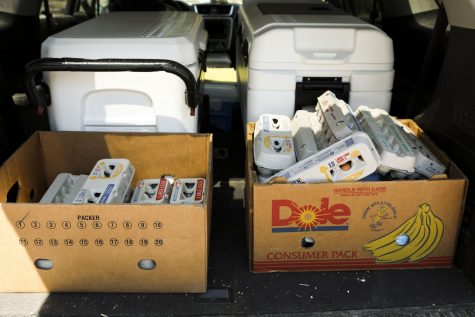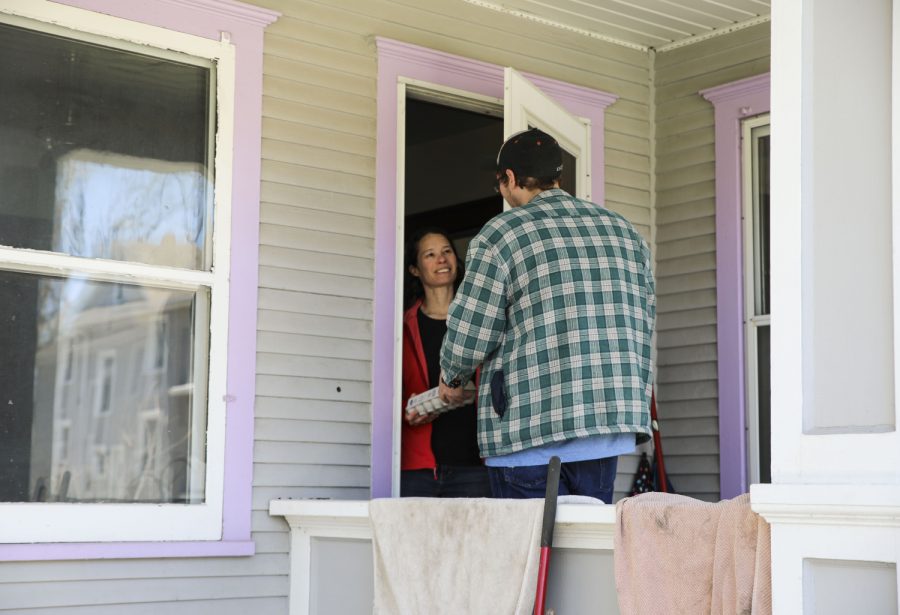Iowa farmers struggle as COVID-19 impacts ripple through food supply
Across the state, farmers are feeling the impacts of the novel coronavirus pandemic as closed farmers markets, restaurants, and meat-packing plants create financial struggles while crop prices drop.
Andrew Kueter-Chadwick makes the 1st stop of the day delivering one dozen eggs to Maurine Neiman as seen.on Saturday April 18,2020.
April 28, 2020
Nicholle Dawson’s Parnell, Iowa farm purchased an additional 800 hens to “gear up” for this year’s farmers markets, she said. Now, as the area’s summertime farmers markets continue to plan for limited operations and she transitions to full time no-contact delivery, she has 800 extra mouths to feed without being able to fully tap into her normal source of income.
She co-owns 6 Acre Farms LLC, which specializes in egg production and is located in Iowa County, one of 22 counties that Iowa Gov. Kim Reynolds on Monday deemed not yet ready to reopen. The operation moved to full time, no-contact delivery in North Liberty, Tiffin, Coralville, and Iowa City. While the farm has seen an increase in customers since COVID-19 appeared in Johnson County, it doesn’t make up for the revenue it lost from farmers markets’ cancellations and delays, she said.
Iowa’s farmers were hit with one of the wettest years on record last year, leaving many with financial struggles and a hope that 2020 would be better. Owners of farms of all sizes were looking forward to this spring’s growing season, but now find themselves in another tough year as the novel coronavirus pandemic ripples through America’s entire food supply, limiting meat-processing plant operations, closing restaurants, delaying farmers markets, and causing crop prices to drop.
Because of outbreaks of COVID-19 in meat-processing plants across the state, Reynolds mandated on April 20 that the essential plants would remain open but run limited operations to protect their workers. Restaurants are either closed or running curb-side pickup and delivery operations, and farmers markets were planning to conduct similar operations until Reynolds announced April 24 that the markets could reopen Monday as long as they took “appropriate precautions,” such as practicing social distancing.
In Reynolds’ proclamation on Monday, 77 counties, not including Johnson County, were permitted to reopen restaurants, fitness centers, malls, libraries, race tracks, and other retail establishments in a “limited fashion” and loosened restrictions on religious and spiritual gatherings. On April 24, she announced farmers markets statewide could begin limited operations this week, although Iowa City’s farmers market plans to continue curb-side pickup.
In total, Iowa’s largest agricultural industries are predicted to suffer through staggering revenue hits. An April 28 study from Iowa State University estimated that the “overall annual damage will be roughly $788 million for corn, $213 million for soybeans, over $2.5 billion for ethanol production losses and $347 million in losses due to falling ethanol prices, $658 million for fed cattle, $34 million for calves and feeder cattle, and $2.1 billion for hogs.”
The ripples from these shutdowns, closures, and financial changes are large enough to reach local farmers in the Iowa City area. Iowa Valley RC&D Food Systems Director Jake Kundert said the majority of local farms in Johnson County get their revenue from their Community Supported Agriculture organizations, restaurant sales, and farmers markets.
Farmers base their production and decision making on those markets, he said, so many have been greatly impacted by farmers-market delays and restaurant closures. This has forced many growers to join the virtual movement of putting their products online through Facebook, Instagram, and their own websites, and delivering their products directly to customers’ doorsteps, Kundert said.
RELATED: Small businesses in Iowa are asking for $148 million in state aid
The transition to online sales has created a spike in attention and new customers, he added, but often also creates a hurdle for farmers who aren’t familiar with running a digital shop and feel that it takes time away from other work they could be doing on their land.
Reynolds announced April 24 that farmers markets could resume activities with proper social-distancing measures in place as soon as Monday. Although farmers markets often turn into social gatherings, with artists and non-food items sold or activities taking place, Reynolds said only food items would be permitted.

The Iowa City Farmers Market’s in-person start date was delayed until July 4 due to social-distancing guidelines, but the city is continually working to connect local farmers and vendors with the market’s customers through online and contact-free alternatives.
Iowa City Parks and Recreation Director Juli Seydell Johnson announced April 20 that the farmers market will partner with Field to Family to offer a curbside distribution market starting May 9 at the Chauncey Swan Parking Ramp. The market is normally held May through October. Home-delivery options are also being discussed to expand access, the announcement stated.
The market would allow for contact-free shopping as all ordering and payments would be handled online ahead of the actual curbside pick-up, said Iowa City Parks and Recreation Administrative Secretary Tammy Neumann. Customers can order from as many vendors as they choose and will be provided with an order number to indicate to staff and volunteers which order is for whom, she said.
Dawson stressed the importance of “farm fresh” education and encouraged customer loyalty to small businesses and local farms in the area. Curbside orders will include food-system education materials such as seasonal menu charts, recipes, profiles of local producers, and local foods.
“We, as a community, need to recognize the importance of small businesses and local farms, and the importance of what we produce because we can give [the community] the goods that they need when the stores are out of it,” she said. “Stores are out of [products and produce] every day — they run out. So, without small businesses like ours, [community members] wouldn’t be able to get their products, especially not fresh products.”
All across the state, hog farmers in particular are facing difficulties selling their livestock and have excess hogs as slaughterhouses and meat-processing plants begin to slow their operations or temporarily shut down because of coronavirus outbreaks in numerous facilities.
Steve Berger, a farmer who owns a multigenerational family farm in Washington County, which is not included in Reynolds’ 77-county restriction loosening, said he would normally market hogs at the Tyson Foods’ pork-processing plant in Columbus Junction and is struggling to find places to sell his pork.
The plant closed April 6 for two weeks but resumed “limited operations” April 21 after Reynolds’ announcement April 20. Reynolds said the state’s meat-packing plants will stay open in order to avoid the devastating effects that would befall farmers and the food supply if the plants were to shut down.
The closures and limited operations are sparking concerns among livestock farmers that the state will eventually face meat shortages and leave farmers without markets to sell their animals to, which would push down the price for livestock and make meat more expensive. During the press conference April 21, Reynolds said there was also a growing worry that livestock will have to be euthanized in the near future, which would create devastating financial woes for the entire food supply.
RELATED: Iowa officials call for immediate assistance for pork producers
In a letter sent Monday, Reynolds and other Iowa leaders urged Vice President Mike Pence to provide resources and compensation for farmers if they need to euthanize hogs.
Berger added that farmers are dealing with the challenge of market disruption in commodity prices, and he recommended that farmers take advantage of their circumstances any way they can during these unfavorable times.
“You can buy into seed inputs,” Berger said. “If you feed hogs, you want a low corn price, so low corn prices aren’t a bad thing if you’re a hog farmer. There’s two sides of the market and it just depends which side you’re on. So, some of the rules have changed and you can take advantage of it.”
But not all farmers have such a hopeful mindset during this time.
Rob Ewoldt, a farmer who owns a family farm in Davenport, said farmers raise hogs to an optimal size — about 270 pounds — after which point hogs tend to gain more fat. In order to avoid keeping oversized hogs, farmers have to ship hogs to plants further away, costing them more money and taking a significant toll atop the struggles farmers are already facing, he said.
In addition to the meat industries’ impact, the prices of all major crops are dropping. Future prices for ethanol have plunged by 40 percent, corn by 15 percent, soybeans by 10 percent, and cotton by 3 percent, according to the American Farm Bureau.
“We use corn for ethanol, we use soybeans for biodiesel. But nobody’s traveling, so nobody’s using that product and we’re just building up as there’s no much demand for our products right now,” Ewoldt said. “I’m a businessman. We have to be able to make money to keep our operation going and right now we’re not. We’re having some really uncertain times and I think a lot of farmers would agree.”














